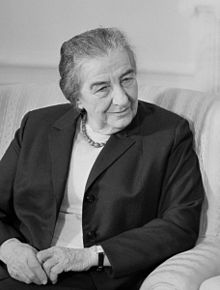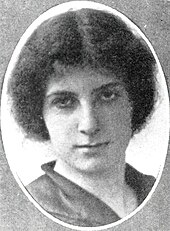Golda Meir
Golda Meir ( Hebrew גולדה מאיר, born Goldie Mabovitch or Mabowitz , married Meyerson , in Israel also Meirson , since 1951 Meir ; born on May 3, 1898 in Kiev , Russian Empire , today Ukraine ; died December 8, 1978 in Jerusalem ) was an Israeli politician ( Mapai / Awoda ). She was Foreign Minister from 1956 to 1965 and Prime Minister of Israel from March 17, 1969 to June 3, 1974 .
Life
Childhood and youth
Golda Meir's parents were the carpenter Moshe Yitzhak Mabovitch and his wife Bluma. Even during her earliest childhood in Kiev, she experienced pogroms against Jews. Her father fled to the United States when she was five and brought his family to Milwaukee , Wisconsin in 1906 . Among other things, she attended the Fourth Street School , which is named after her today , which she graduated as the best of the year after eighth grade. Because her mother rejected higher education for girls and wanted her daughter to marry early instead, Golda left her parents in 1912, moved to Denver with her older sister Sheyna and went to high school. In Denver she first came into contact with Zionist circles and also met her future husband, Morris Meyerson (also: Myerson, 1893–1951) from Lithuania.
After two years of separation, the parents gave in to their desire for education, she returned to Milwaukee in 1914, where she graduated from high school in 1916. During this time she also became an active member of the socialist-Zionist organization Poale Zion . From 1915 she taught at the Yiddish-speaking folk school in Milwaukee, which taught children about Jewish culture and national awareness . After graduating from high school, she began teacher training at Milwaukee State Normal School , which she dropped out after two semesters to devote herself to politics. She was heavily involved in the American Jewish Congress election campaign , but was not a delegate herself. In the summer of 1917 she moved to Chicago, where she worked part-time in the city library, but her main interest was political activities for Poale Zion. Golda Mabowehz (as she wrote her name at the time) and Morris Meyerson were married in December 1917.
Political activity in Palestine
In 1921 Meir moved with her husband to Palestine , which was then a mandate of the League of Nations under British administration. The two lived there for three years in the kibbutz Merchawia and then moved to Tel Aviv . The two children, Menachem and Sahra, were born in Jerusalem.
Meir was initially an activist in the trade union federation Histadrut and from 1928 executive secretary of Moʿezet HaPoʿalot (Workers' Council). In 1929 she was a delegate at the World Zionist Congress . The following year she joined the "Workers' Party of the Land of Israel" ( Mapai ), which emerged from the "right" wing (more Zionist, less Marxist) of Poale Zion. She soon assumed important functions in the party led by David Ben-Gurion . From 1932 to 1934 she was an envoy of the Moʿezet HaPoʿalot to the Pioneer Women's Organization in the USA. After her return from the United States, she rose to the Executive Committee of the Histadrut. After Moshe Sharet was arrested by the British Mandate Administration, Meir headed the political department of the Jewish Agency from 1946 . During the 1940s she became a central figure in the difficult negotiations with the British Mandate.
Ambassador and Minister of Israel
Four days before the proclamation of the State of Israel on May 14, 1948, Golda Meir conducted secret, unsuccessful peacekeeping negotiations with the Jordanian King Abdallah , with the intention of regulating the partition of Palestine between his kingdom and the Jewish state and removing the Arab Legion from the to keep out an imminent military attack. Shaped by her childhood in anti-Semitic Russia, politics was a struggle for survival for her. She saw no possible compromise between the interests of the Arab and Jewish population in Israel ("The Arabs want to see us dead. We want to live. There is no compromise.").
Golda Meir was Israel's first ambassador to the Soviet Union from 1948 to April 1949 . From the declaration of independence, she was also a Mapai representative on the 37-member Provisional Council of State, which acted as a provisional legislative body until the first Knesset election . In the election in January 1949 - which the Mapai clearly won - it then entered the Israeli parliament for the first time. She was re-elected as a MP seven times and was a member of the Knesset without interruption until 1974.
She was appointed Minister of Labor in David Ben-Gurion's first cabinet . She held this office until 1956 (also under Prime Minister Moshe Sharet ). From 1956 to 1965 she headed the Foreign Ministry under the heads of government Ben-Gurion and Levi Eschkol . From 1966 to 1968 she was general secretary of the Mapai party. Their commitment to the reunification of the fragmented Zionist left ultimately led to the merger of Mapai, Ben-Gurion's short-lived Rafi and Achdut haAwoda party to form the united labor party Avoda .
Head of government
On March 17, 1969, Golda Meir was elected Prime Minister to succeed the late Levi Eshkol. In addition, she also took over the party leadership of the Avoda. For the upcoming Knesset election in October 1969 , her party formed an alliance with the Mapam, who was further to the left, called HaMaʿarach (“The Connection”), which won the election. In August 1970, Meir pushed through the armistice on the Suez Canal against fierce resistance in his own ranks , which ended the so-called war of attrition with Egypt . Her conflict with the Austrian Chancellor Bruno Kreisky in the autumn of 1973 caused a sensation because of his decision to close the Schönau transit camp for Jewish emigrants from the Soviet Union .
Because of the initially successful Arab surprise attack, it came under heavy domestic political criticism at the end of the Yom Kippur War of 1973. The Jordanian King Hussein flew to Tel-Aviv on September 25, 1973 and warned the Israeli government that Egypt and Syria were planning an attack. According to Aviezer Yaari , head of the Syria / Lebanon / Iraq bureau of the Aman military intelligence service , Hussein announced that the Syrian army was ready for war. According to the head of the Aman, Major General Eli Zeira , Golda Meir did not attach great importance to the warning of Hussein and did not even ask about the specific date of the planned attack.
In the Knesset election on December 31, 1973 , their party alliance Maʿarach fell from 56 to 51 seats. After a lengthy government crisis, Meir formed another government on March 10, 1974. She announced her resignation as early as April 11, 1974, but carried on the official business until Yitzchak Rabin replaced her on June 3, 1974.
Last years
In 1975 Meir was awarded the Israel Prize . She died of lymph gland cancer in 1978 at the age of 80 and was buried in the Herzlberg National Cemetery in Jerusalem .
media
Her autobiography was published in English in 1973. Scherz Verlag (Bern) acquired the rights for a German translation on April 10, 1973. About a month later, on May 16, 1973, Hoffmann and Campe also signed a contract with the publisher of the original edition, the British publisher Weidenfeld & Nicolson in London . As a result, there was a legal dispute over the sale of the book in Germany , as Scherz Verlag had a branch in Munich and obtained an injunction against the Hamburg publisher on May 4, 1973 in order to secure sole distribution rights on the German market.
Golda Meir as Prime Minister of the State of Israel was portrayed in the 1982 television movie Golda Meir ( A Woman Called Golda ), with Ingrid Bergman in the title role and Leonard Nimoy as husband Morris Myerson. Meir is portrayed by Colleen Dewhurst in Michael Anderson's 1986 television movie Law of Terror . In the feature film Die 21 Stunden von München (1976), the German actress Else Quecke plays the Prime Minister.
See also
literature
- Golda Meir: Life for my country, self-testimony from life and work . Scherz Verlag, Bern / Munich 1973, (autobiography).
- Golda Meir: My life. German by Hoffmann and Campe, Hamburg 1975, ISBN 3-455-05110-3 .
- Richard Amdur: Golda Meir: A Leader in Peace and War. Fawcett Columbine, New York 1990.
Web links
- Literature by and about Golda Meir in the catalog of the German National Library
- Meir, Golda (née Mabovitch; 1898–1978). In: Jewish Agency for Israel . Archived from the original on February 19, 2008 .
- Knesset Members: Golda Meir. Knesset (English).
- Prime Minister Golda Meir. Prime Minister's Office , archived from the original on February 1, 2002 .
Individual evidence
- ↑ Elinor Burkett : Golda. Harper Collins, New York et al. a. 2008, p. 5.
- ↑ Avraham Avi-hai: The POSTman knocks twice: The several faces of Golda Meir. In: The Jerusalem Post , March 13, 2014.
- ↑ Elinor Burkett: Golda. Harper Collins, New York et al. a. 2008, p. 16.
- ↑ Francine Klagsbrun: Lioness. Golda Meir and the Nation of Israel. Schocken Books, New York 2017, pp. 40–43.
- ↑ Francine Klagsbrun: Lioness. Golda Meir and the Nation of Israel. Schocken Books, New York 2017, pp. 49–54.
- ↑ Francine Klagsbrun: Lioness. Golda Meir and the Nation of Israel. Schocken Books, New York 2017, p. 55.
- ↑ Francine Klagsbrun: Lioness. Golda Meir and the Nation of Israel. Schocken Books, New York 2017, p. 62.
- ↑ Francine Klagsbrun: Lioness. Golda Meir and the Nation of Israel. Schocken Books, New York 2017, pp. 63–65.
- ↑ Francine Klagsbrun: Lioness. Golda Meir and the Nation of Israel. Schocken Books, New York 2017, pp. 68–69.
- ↑ Francine Klagsbrun: Lioness. Golda Meir and the Nation of Israel. Schocken Books, New York 2017, p. 71.
- ↑ PrimeMinisters / Golda.htm Prime Minister Golda Meir . Prime Minister's office
- ↑ Help, the Cossacks are coming! In: Der Spiegel . No. 30 , 1970 ( online ).
- ↑ Meir, Golda (née Mabovitch; 1898–1978). In: Jewish Agency for Israel . Archived from the original on February 19, 2008 ; accessed on December 8, 2018 .
- ↑ 1973. Yom Kippur. An October War by Vincent de Cointet. Film report, broadcast on arte on October 15, 2013
- ^ Grave of Golda Meir knerger.de
- ↑ Press release from Scherz Verlag, Munich, August 1, 1973
- ↑ A Woman Called Golda . In: Two thousand and one lexicon of international film
- ↑ Hans-Werner Bartsch : Background information on the Middle East War: The reality of a foreign body. In: The time . November 9, 1973. Retrieved December 8, 2018 .
| personal data | |
|---|---|
| SURNAME | Meir, Golda |
| ALTERNATIVE NAMES | Meirson, Golda; Mabovitch, Golda (maiden name); Meïr, Golda |
| BRIEF DESCRIPTION | Israeli politician and prime minister |
| DATE OF BIRTH | May 3, 1898 |
| PLACE OF BIRTH | Kiev |
| DATE OF DEATH | December 8, 1978 |
| Place of death | Jerusalem |




